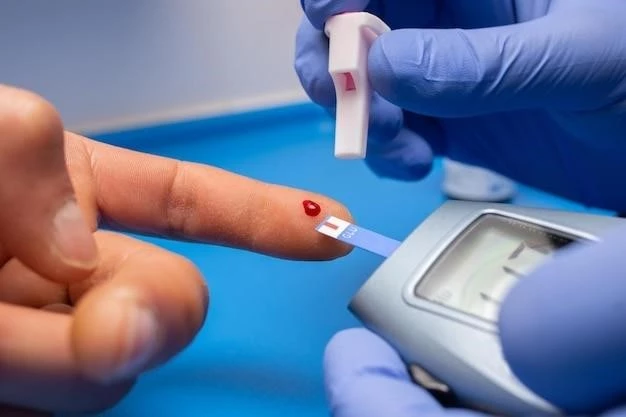Understanding Diabetes Insipidus, Nephrogenic Type 3
Welcome to your comprehensive guide on Diabetes Insipidus, focusing on the nephrogenic type 3 variant. This rare genetic condition affects the kidneys’ ability to concentrate urine٫ leading to excessive urination (polyuria) and thirst (polydipsia). Stay tuned to delve deeper into the endocrinology٫ familial aspects٫ treatment options٫ and current research surrounding this condition.
Introduction to Diabetes Insipidus
Diabetes Insipidus (DI) is a rare condition characterized by the inability to conserve water due to the inadequate production or utilization of antidiuretic hormone, also known as vasopressin. Within the spectrum of DI, nephrogenic type 3 is a specific form that results from genetic mutations affecting the kidney’s response to vasopressin.
Individuals with nephrogenic DI type 3 experience profound thirst (polydipsia) and pass large volumes of diluted urine (polyuria), leading to disruptions in daily life and potential complications if left untreated.
Understanding the distinctions between the various types of DI is crucial for accurate diagnosis and personalized management. Nephrogenic DI type 3 presents unique challenges due to its genetic basis٫ complicating the renal response to vasopressin and necessitating specialized approaches to treatment.
As we delve deeper into the specifics of nephrogenic DI type 3, keep in mind the importance of early detection, proper diagnosis, and tailored intervention strategies. By enhancing your knowledge of this condition, you can empower yourself or your loved ones to navigate the complexities of nephrogenic DI type 3 with confidence and informed decision-making.
Understanding Endocrinology of DI
Exploring the endocrinology of Diabetes Insipidus (DI) sheds light on the intricate hormonal mechanisms that underlie this condition. At the core of DI is the hormone vasopressin, also known as antidiuretic hormone, which plays a crucial role in regulating water balance in the body.
In individuals with DI, either the production of vasopressin is insufficient (in central DI) or the kidneys fail to respond to the hormone effectively (in nephrogenic DI). This disruption leads to the hallmark symptoms of excessive urination (polyuria) and thirst (polydipsia) that are characteristic of the condition.
Understanding the interaction between vasopressin, its receptors in the kidney, and the downstream signaling pathways is key to comprehending the pathophysiology of DI. In nephrogenic DI type 3, specific genetic mutations impact these processes, creating a unique subtype of the disease with distinct clinical manifestations.
By grasping the endocrine intricacies of DI, individuals affected by nephrogenic DI type 3 and their healthcare providers can tailor treatment approaches to target the underlying hormonal imbalances. Stay informed about the latest insights in DI endocrinology to empower yourself in managing this complex disorder effectively.
Symptoms of Nephrogenic DI Type 3
Recognizing the symptoms of Nephrogenic Diabetes Insipidus (DI) Type 3 is crucial for early identification and intervention. This genetic condition presents with distinctive clinical manifestations that impact urinary and fluid regulation in the body.
Individuals with Nephrogenic DI Type 3 may experience excessive thirst (polydipsia) as their bodies attempt to compensate for the inability to concentrate urine effectively. This profound thirst is often accompanied by excessive urination (polyuria), leading to frequent trips to the bathroom and disrupted sleep patterns.
Some individuals with Nephrogenic DI Type 3 may also exhibit signs of electrolyte imbalances due to the loss of water and electrolytes through increased urination. Symptoms such as dehydration, fatigue, and weakness can manifest if the condition is not adequately managed.
Understanding and monitoring these symptoms can aid in the timely diagnosis and treatment of Nephrogenic DI Type 3. By staying vigilant and seeking medical attention if you or a loved one experiences these symptoms, you can proactively address the challenges posed by this rare genetic disorder and work towards optimizing health and well-being.
Causes of Nephrogenic DI Type 3
Understanding the underlying causes of Nephrogenic Diabetes Insipidus (DI) Type 3 is vital in unraveling the genetic basis of this rare renal condition. Nephrogenic DI Type 3 is primarily attributed to genetic mutations that impact the kidney’s response to vasopressin, the hormone responsible for regulating water reabsorption.
Specific genetic mutations affecting genes involved in the vasopressin signaling pathway can disrupt the kidneys’ ability to concentrate urine efficiently, leading to the hallmark symptoms of polyuria and polydipsia seen in Nephrogenic DI Type 3.
Inherited in an autosomal dominant pattern, Nephrogenic DI Type 3 can present unique challenges due to the familial nature of the genetic mutations. Understanding the genetic predisposition to this condition can help individuals and families make informed decisions regarding genetic testing, family planning, and personalized treatment approaches.
By delving into the genetic causes of Nephrogenic DI Type 3, researchers and healthcare providers aim to unravel the complex interplay of genetic factors that drive this condition. Stay informed about the latest advancements in genetic research to better understand the mechanisms behind Nephrogenic DI Type 3 and explore novel therapeutic targets for improved management.
Diagnosis of Nephrogenic DI Type 3
Accurate diagnosis of Nephrogenic Diabetes Insipidus (DI) Type 3 is paramount for initiating targeted treatment and management strategies tailored to the specific genetic underpinnings of this condition. Healthcare providers employ a comprehensive approach to diagnose Nephrogenic DI Type 3, considering both clinical presentations and genetic testing.
Medical history assessment plays a crucial role in identifying symptoms such as polyuria, polydipsia, and potential electrolyte imbalances indicative of Nephrogenic DI Type 3. Physical examinations and urine concentration tests may also be conducted to evaluate kidney function and urine dilution ability.
Genetic testing is a cornerstone in diagnosing Nephrogenic DI Type 3, as it enables the identification of specific mutations in genes associated with vasopressin signaling. These genetic analyses provide invaluable insights into the genetic basis of the condition, guiding healthcare providers in formulating personalized treatment plans.
Collaboration between healthcare professionals, genetic counselors, and individuals with Nephrogenic DI Type 3 is essential in navigating the diagnostic process. By actively participating in diagnostic discussions and genetic testing٫ individuals can gain a deeper understanding of their condition and contribute to ongoing research efforts aimed at advancing diagnostics and treatment modalities.
Familial Aspects of Nephrogenic DI Type 3
Exploring the familial aspects of Nephrogenic Diabetes Insipidus (DI) Type 3 offers insights into the genetic inheritance patterns and familial implications of this rare renal disorder. As an autosomal dominant genetic condition, Nephrogenic DI Type 3 has unique familial considerations that can impact individuals and their families.
Individuals with a family history of Nephrogenic DI Type 3 may have an increased risk of inheriting the genetic mutation associated with the condition. Genetic counseling plays a pivotal role in discussing the hereditary nature of Nephrogenic DI Type 3٫ offering families the opportunity to understand the risks٫ implications٫ and options for genetic testing.
Family planning considerations are important for individuals with Nephrogenic DI Type 3 or carrying the genetic mutation. Discussing reproductive choices, genetic testing for family members, and the potential impact on future generations can empower individuals to make informed decisions regarding their health and that of their family.

Support networks within families affected by Nephrogenic DI Type 3 can provide emotional support, shared experiences, and resources for coping with the condition. By fostering open communication, education, and genetic awareness within families, individuals can navigate the familial aspects of Nephrogenic DI Type 3 with resilience and proactive healthcare management.
Treatment Options for Nephrogenic DI Type 3
Exploring treatment options for Nephrogenic Diabetes Insipidus (DI) Type 3 is essential in managing the symptoms and complications associated with this genetic renal disorder. As Nephrogenic DI Type 3 differs from other forms of DI in its resistance to vasopressin, targeted therapeutic approaches are key to improving quality of life.
One mainstay of treatment for Nephrogenic DI Type 3 involves addressing fluid balance through adequate hydration and a controlled diet. Monitoring fluid intake and urine output can help individuals maintain hydration levels and prevent electrolyte imbalances.
Pharmacological interventions, such as thiazide diuretics, may be prescribed to reduce urine volume and enhance water reabsorption in the kidneys. These medications can help alleviate symptoms of polyuria and polydipsia in individuals with Nephrogenic DI Type 3.
Additionally, lifestyle modifications, including avoiding triggers that exacerbate symptoms, maintaining a healthy weight, and engaging in regular physical activity, can complement pharmacological treatments and support overall well-being in individuals with Nephrogenic DI Type 3.
Close monitoring by healthcare providers, regular follow-up visits, and ongoing communication about treatment efficacy are essential components of managing Nephrogenic DI Type 3. By actively participating in your treatment plan and collaborating with your healthcare team, you can optimize symptom control, minimize complications, and enhance your overall quality of life while living with Nephrogenic DI Type 3.
Current Research on Nephrogenic DI Type 3
Stay informed about the cutting-edge research initiatives focused on advancing the understanding and management of Nephrogenic Diabetes Insipidus (DI) Type 3. Ongoing research endeavors are dedicated to unraveling the complex genetic mechanisms, exploring novel treatment modalities, and improving outcomes for individuals affected by this rare renal condition.
Genetic studies play a crucial role in identifying new gene mutations associated with Nephrogenic DI Type 3, shedding light on the intricate molecular pathways that regulate water balance in the kidneys. By elucidating these genetic factors, researchers aim to develop targeted therapies that address the specific genetic abnormalities underlying Nephrogenic DI Type 3.
Exploration of pharmacological interventions, including novel drug targets and treatment strategies, forms a significant aspect of current research on Nephrogenic DI Type 3. Researchers are investigating potential therapies that enhance kidney responsiveness to vasopressin or modulate water reabsorption mechanisms to mitigate symptoms and improve quality of life.
Advancements in diagnostic tools and genetic testing technologies are also a focal point of research efforts, aiming to streamline the diagnostic process, improve accuracy, and facilitate early intervention for individuals with Nephrogenic DI Type 3. By refining diagnostic approaches, researchers seek to expedite treatment initiation and optimize outcomes for affected individuals.
Engagement with the latest research findings, clinical trials, and scientific developments in the field of Nephrogenic DI Type 3 can provide valuable insights for individuals٫ caregivers٫ and healthcare providers. By staying abreast of current research trends٫ you can empower yourself with knowledge٫ contribute to the progress in understanding this condition٫ and potentially access emerging treatment options that may enhance your management of Nephrogenic DI Type 3.
